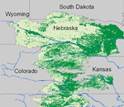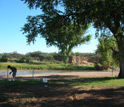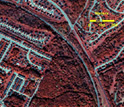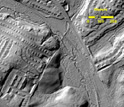News Release 10-182
NSF Awards Grants for Study of Water Sustainability and Climate
Scientists conduct research on how Earth's water system is linked to climate change, land use, ecosystems
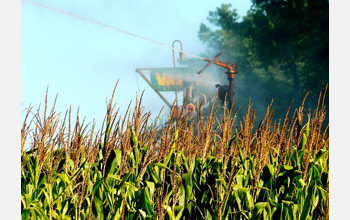
Irrigation using pumped groundwater plays a crucial role in sustaining agricultural production.
October 6, 2010
This material is available primarily for archival purposes. Telephone numbers or other contact information may be out of date; please see current contact information at media contacts.
Among the most urgent challenges facing the world today is ensuring the adequate supply and quality of water, scientists say, especially in light of burgeoning human needs and climate variability and change.
Despite water's importance to life on Earth, major gaps exist in our understanding of water availability, quality and dynamics, and the impacts of a changing climate and human activity on Earth's water system.
To better understand how our planet's water cycle works, the National Science Foundation (NSF) has awarded 17 grants through its Water Sustainability and Climate (WSC) solicitation.
The goal of these projects is to understand and predict the interactions of Earth's water system with climate change, land use, the built environment, and ecosystem function and services.
"We need to determine how our built water systems and our governance systems can be made more reliable, resilient, and sustainable," says Tim Killeen, NSF assistant director for Geosciences.
"They must meet diverse and often conflicting needs," says Killeen, "such as minimizing consumption of water for energy generation, industrial and agricultural production, and built environment requirements."
The WSC solicitation is supported and managed by NSF's Directorate for Geosciences; Directorate for Engineering; Directorate for Biological Sciences; and Directorate for Social, Behavioral & Economic Sciences.
The awards are for studies of the water system using observations at specific sites, in combination with models that allow for spatial and temporal extrapolation to other regions, as well as integration across different Earth processes.
"The results will advance our understanding of Earth's water resources," says Killeen, "and with it, our predictive capability not only for the availability of water, but for the future of life on our planet."
CATEGORY 1: WORKSHOP PLANNING GRANTS
WSC-Category 1: Linking freshwater inputs to ecosystem functioning and services provided by a large mangrove estuary
PI (Principal Investigator): Michael C. Sukop, Florida International University
Summary: The objectives are to 1) generate an empirical and analytic approach to linking water balance and carbon budgets to ecosystem function and services in a mangrove estuary; and 2) develop a long-term plan for implementing the approach and integrating the results into decision-making forums for allocating water resources in the region. The study area is part of Everglades National Park.
WSC-Category 1: Hydrologic and Ecological Impacts of Changes in Human Water Resource Management in Response to Climate Change and Urbanization
PI: Douglas Jackson-Smith, Utah State University
Summary: What are the intended and unintended consequences of changes in water allocation and water use efficiency in response to anticipated climate change and urbanization? The project will build on the results of a co-located NSF-funded WATERS test bed watershed, a USDA Conservation Effects Assessment Program (CEAP) research watershed, and an EPA Targeted Watersheds Project in the Intermountain West.
WSC-Category 1: Sustainability on the Border: Water, Climate, and Social Change in a Fragile Landscape
PI: William Hargrove, University of Texas at El Paso
Summary: The project will conduct workshops to analyze the resilience, adaptability, and transformability of the ecological/social system in response to change. The system under study is the Middle Rio Grande River and the U.S./Mexico border at El Paso/Juarez, which presents unique challenges in a complex biophysical and socioeconomic environment complicated by violence, migration, and social inequities.
WSC-Category 1: Learning from Adaptable Water Systems
PI: Joan Rose, Michigan State University
Summary: This planning grant focuses on developing research procedures that integrate the observation and modeling of human water and wastewater systems as they adapt to environmental changes. The project will integrate existing initiatives to assess Michigan's Lake St. Claire and Grand River watersheds, to examine the changes and potential future changes through social science lenses, and explore the risks to water quality, public health and sustainability in the context of climate change.
WSC-Category 1: Water Sustainability and Climate in the Great Lakes Region of East Africa
PI: Thomas C. Johnson, University of Minnesota Duluth
Summary: The East African Rift lakes have seen increased occupation and settlement as a result of conditions favorable to agriculture, an abundance of fish, an apparent surplus of fresh water, relatively tolerable climate conditions, and an aesthetically pleasing landscape. This project will develop an interdisciplinary research plan for water sustainability and climate in the Lake Malawi basin, which typifies much of the great lakes region of tropical East Africa.
WSC-Category 1: Coupled Observation of the Water Environment: A National Survey Program
PI: John B. Braden, University of Illinois at Urbana-Champaign
Summary: Braden and colleagues will produce insights that improve our understanding of coupled water systems, lead to development of predictive scientific models that incorporate human behavior, and enable policies and institutions that improve environmental outcomes while also increasing the economic value of water. The researchers will engage in efforts with agencies such as NOAA, USEPA, USDA, USGS, and BLS to identify complementary sources of physical, biological, and social observations.
WSC-Category 1: Sustainability Dynamics for Water Resources in a Rapidly Urbanizing and Climatically Sensitive Region
PI: James R. Gosz, University of Idaho
Summary: This project will address water resources broadly: climate dynamics, water quantity/quality, landscape dynamics, distributed and renewable energy, social/economic factors, cultural and demographic change, natural resource law, built environment/engineering infrastructure, transportation planning/policies, urban-wildland/agriculture interface, and new threats in the Spokane, Washington-Coeur d'Alene, Idaho corridor.
WSC-Category 1: Building an economically sustainable restoration and monitoring plan for forested watersheds in Northern Arizona
PI: Abraham E. Springer, Northern Arizona University
Summary: Springer and others will link watershed and forest management metrics with ecological economics to devise a model for a watershed services market that offsets costs of large-scale ecological restoration of forested ponderosa pine (Pinus ponderosa) forest in northern Arizona. A successful water market with stakeholders paying for watershed management benefits would support the maintenance, monitoring, and restoration of forest health while also providing sustainable water resources.
WSC-Category 1: Humans, Hydrology, Climate Change, and Ecosystems- An Integrated Analysis of Water Resources and Ecosystem Services in the Great Lakes Basin
PI: Alex S. Mayer, Michigan Technological University
Summary: The Great Lakes region of North America is water-rich, but concern exists that its water resources may be over-used. Scientists will conduct workshops to address this question with the plan to (a) develop integrated biophysical models for predicting ecosystem impacts due to future land and climate change and (b) develop an understanding of how the region's groups and individuals view the regions' aquatic resources.
WSC-Category 1: Integrated Biophysical-Social Research for Water and Ecosystem Sustainability in an Effluent-Driven Urbanizing Watershed
PI: David Hoeinghaus, University of North Texas
Summary: The upper Trinity River basin study area, including the Dallas - Fort Worth Metroplex, has great potential as a model system for the study of rapidly urbanizing watersheds that are increasingly reliant on surface water. Field research and public surveys will fill in gaps in available data and lead to human and natural systems modeling.
CATEGORY 2: OBSERVATORIES AND MODELLING
WSC-Category 2: Extreme events impacts on water quality in the Great Lakes: Prediction and management of nutrient loading in a changing climate
PI: Anna M. Michalak, University of Michigan Ann Arbor
Summary: The Great Lakes are a vital freshwater resource with chronic water quality problems. This research asks: What are the possible effects of climate-changed-induced extreme events on water quality and ecology in the Great Lakes system, and what management strategies will be effective in addressing these change
WSC-Category 2: Regional Climate Variability and Patterns of Urban Development - Impacts on the Urban Water Cycle and Nutrient Export
PI: Claire Welty, University of Maryland Baltimore County
Summary: The goal of the research is to evaluate the interactions between urban development patterns and the hydrologic cycle and its associated nutrient cycles, in the context of regional and local climate variability. The specific objective is to create a modeling system to simulate the feedback relationships that control urban water sustainability.
WSC-Category 2: Climate Change, Shifting Land Use, and Urbanization in a Midwestern Agricultural Landscape: Challenges for Water Quality and Quantity
PI: Christopher Kucharik, University of Wisconsin-Madison
Summary: How will ecosystem services vary and how can they be sustained in regional watersheds as climate, land use and land cover, the built environment and human demands change? The focus is the Yahara Watershed of Wisconsin, an exemplar of water-related issues in the Upper Midwest.
CATEGORY 3: MODELLING
WSC-Category 3: Toward Sustainability of the High Plains Aquifer Region: Coupled Landscape, Atmosphere, and Socioeconomic Systems
PI: David Hyndman, Michigan State University
Summary: The High Plains region boasts some of the most productive irrigated agricultural land in the United States, made possible by one of the largest contiguous aquifer systems in the world, the Ogallala-High Plains aquifer complex. The project will quantify different levels of sustainability for the region's agricultural practices in the face of increasing demand for agricultural products.
WSC-Category 3: Climate and Population Change and Thresholds of Peak Ecological Water: Integrated Synthesis for Dryland Rivers
PI: Thomas Meixner, University of Arizona
Summary: Meixner and colleagues will work on the San Pedro and Santa Cruz River basins in southern Arizona. Existing scientific and behavioral datasets will be integrated using process-based models, and linked to a public good market allocation model.
WSC-Category 3: Crops, Climate, Canals and the Cryosphere in Asia - Changing Water Resources around Earth's "Third Pole"
PI: Steve Frolking, University of New Hampshire
Summary: This project will generate an integrated assessment of the impacts of climate-driven changes in hydrology on agricultural production and land use in Central, South, East, and Southeast Asia, and their implications for the region's food security and economic welfare in the coming decades. It will assess current and projected water resources in the watersheds of the major rivers draining the Asian High Mountains (the Indus, Ganges, Brahmaputra, Salween, Mekong, Yangtze, Yellow, Amu Darya, Syr Darya and Irtysh Rivers).
This program is part of NSF's investment in Science, Engineering, and Education for Sustainability (SEES). The SEES portfolio address challenges in climate and energy research and education using a systems-based approach to understanding, predicting, and reacting to change in the natural, social, and built environments.
Initial SEES efforts focused on coordination of a suite of research and education programs at the intersection of climate and environment, including specific attention to incorporating human dimensions.
For FY 2010, new solicitations were released that aligned with key aspects of NSF's SEES portfolio. These solicitations (Water Sustainability and Climate; Dimensions of Biodiversity; Ocean Acidification; Regional and Decadal Earth Systems Modeling; and the Climate Change Education Program) resulted in 70 total awards totaling $66 million.
-NSF-
-
Dryland agriculture depends on highly variable rainfall, including summer thunderstorms.
Credit and Larger Version -
In this High Plains Aquifer map, dark green = irrigated areas, light green = dryland agriculture.
Credit and Larger Version -
An aerial view of Madison, Wis., with Lakes Monona (foreground) and Mendota (background).
Credit and Larger Version -
Algae collects near the south shoreline of Lake Mendota in Wisconsin's Yahara Watershed.
Credit and Larger Version -
Section of Arizona's San Pedro River where WSC awardees will conduct studies of river flow.
Credit and Larger Version -
Scientist Scott Simpson takes samples from the San Pedro River in Arizona.
Credit and Larger Version -
False color infrared image of a section of the upper Gwynns Falls watershed in Maryland.
Credit and Larger Version -
Hillshade rendering of the Gwynns Falls, Md., watershed--still undeveloped but changing.
Credit and Larger Version
Media Contacts
Cheryl Dybas, NSF, (703) 292-7734, email: cdybas@nsf.gov
Related Websites
NSF's Science, Engineering, and Education for Sustainability Investment: http://www.nsf.gov/geo/sees/
The U.S. National Science Foundation propels the nation forward by advancing fundamental research in all fields of science and engineering. NSF supports research and people by providing facilities, instruments and funding to support their ingenuity and sustain the U.S. as a global leader in research and innovation. With a fiscal year 2023 budget of $9.5 billion, NSF funds reach all 50 states through grants to nearly 2,000 colleges, universities and institutions. Each year, NSF receives more than 40,000 competitive proposals and makes about 11,000 new awards. Those awards include support for cooperative research with industry, Arctic and Antarctic research and operations, and U.S. participation in international scientific efforts.
Connect with us online
NSF website: nsf.gov
NSF News: nsf.gov/news
For News Media: nsf.gov/news/newsroom
Statistics: nsf.gov/statistics/
Awards database: nsf.gov/awardsearch/
Follow us on social
Twitter: twitter.com/NSF
Facebook: facebook.com/US.NSF
Instagram: instagram.com/nsfgov




